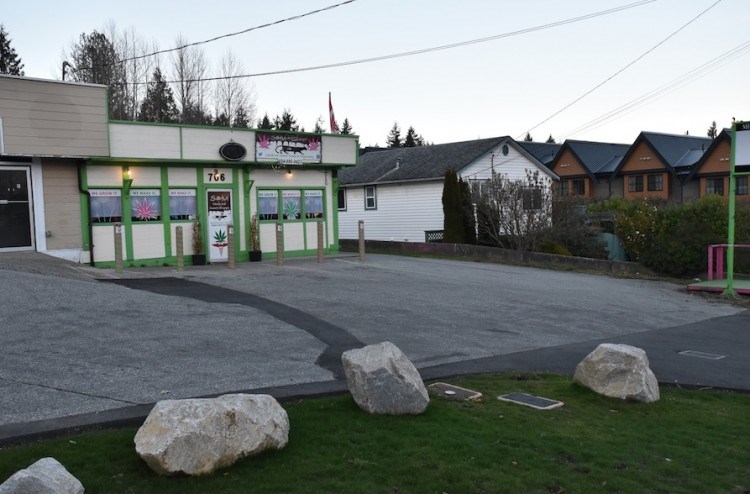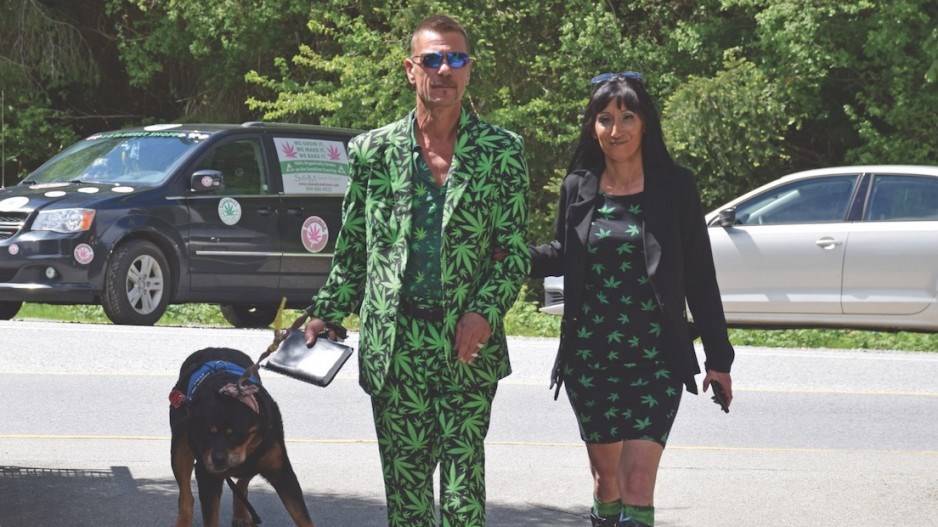While most B.C. municipalities are following Canada’s new cannabis laws, which grant provinces the power to regulate retail licensing, a January decision by Gibsons town council shows not all local governments are on the same page.
That council granted a temporary use permit to allow S&M Medicinal Sweet Shoppe to continue to operate even though its owners don’t plan to apply for a provincial licence, which requires more than $9,000 in fees.
Owners Michelle and Doug Sikora told Business in Vancouver they are staying open because they serve only medical patients, and they believe the federal Cannabis Act runs contrary to the Supreme Court of Canada’s 2016 Allard decision, which affirmed that medical cannabis patients deserve “reasonable access” to their medicine.
B.C. Supreme Court justice Christopher Hinkson did not share that view in a December judgment, in which he ordered street-front medical dispensaries in Vancouver to close.
He accepted that the Constitution, as noted in the Allard decision, guarantees “reasonable access” to cannabis, but he stressed that this did not mean consumers have “unrestricted access.”
His implication was that Canada’s legal regime for retailing cannabis provides reasonable access. Lawyers have filed an appeal of his ruling.
The Sikoras said they are paying $164 per year for a business licence and $1,000 for the temporary use permit.
“Wow! Will @CityofVancouver follow this example?” tweeted Cannabis Culture principal Jodie Emery, after the Gibsons council vote.
The City of Vancouver, however, has been clear that it plans to crack down on cannabis retailers who do not have provincial and city licences, with fines as high as $1,000 per week. Fully licensed stores must pay provincial fees in addition to the city’s annual $33,097 business licence fee.
All of those shops must also be at least 300 metres from schools, community centres, neighbourhood houses, youth facilities and other cannabis retail stores.

That is not the case in Gibsons, where, before Bill Beamish was elected mayor Oct. 20 — three days after Canada legalized recreational cannabis sales — the previous Gibsons council had a policy of granting cannabis stores temporary use permits to allow them to operate, and there were no distance requirements, Beamish explained to Business in Vancouver.
Lawyers, police and B.C. Solicitor General Mike Farnworth are adamant that all cannabis stores are illegal if owners do not have a provincial licence, but the new Gibsons council voted to continue with the previous council’s policy because they saw it as being best for the community.
“I was the lone vote against it,” said Beamish, who considers the store illegal. The town is now consulting with lawyers and its insurance company.
None of the three Gibsons councillors who voted for the motion was available for an interview. One councillor recused herself from voting because she owned a nearby property.
“It’s illegal to operate a retail store without a provincial licence so it doesn’t matter what the municipality does,” said Dentons partner and cannabis lawyer Shea Coulson.
B.C. law is clear, he said, that if a retailer has failed to follow Canada’s cannabis laws after legalization on Oct. 17 that seller will not be granted a licence.
Some legal cannabis store owners in B.C. have told BIV that they have sold cannabis illegally after Oct. 17, but stopped days before an official inspection necessary to get the provincial licence.
Coulson said the provincial licensing branch should not have issued those licences in those cases but that perhaps the branch was not aware of the illegal sales.
“I would say to anyone who wants to retail cannabis not to do that because you will be operating illegally,” he said. “It’s not even a matter of discretion. It’s explicit. It’s an offence. It’s a criminal offence.”
RCMP Staff Sgt. Poppy Hallam told BIV that Gibsons issuing temporary use permits to illegal businesses will not prevent the RCMP from raiding such businesses.
“We’re not sitting idle,” she said. “Enforcement actions are planned.”
B.C.’s Ministry of Public Safety and Solicitor General is creating a “community safety unit” that will operate within the ministry — a unit with the authority to close and fine illegal cannabis retailers, the ministry has said.
Farnworth told BIV in late 2018 that, as more legal retail cannabis stores open across the province, the public can expect to see more enforcement.
Once fully staffed, Farnworth expects the enforcement unit to have 44 full-time employees operating province-wide, out of four regional offices.
Several key positions have been filled and these employees are putting the structure of the unit together.
“Police can shut down stores too because they enforce the Criminal Code,” Coulson said. “The province does not direct police but they have their own discretion and can choose to shut these places down. It’s like if someone opened a pop-up shop selling alcohol. If they don’t have a licence, it’s illegal.”
Click here for original story.



